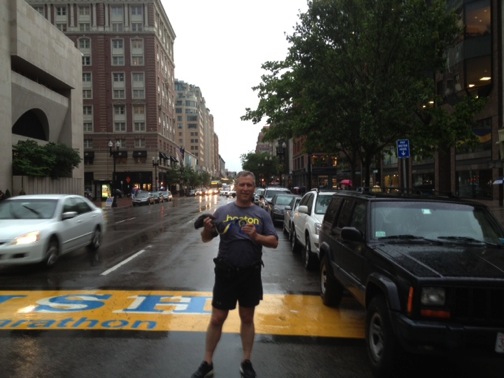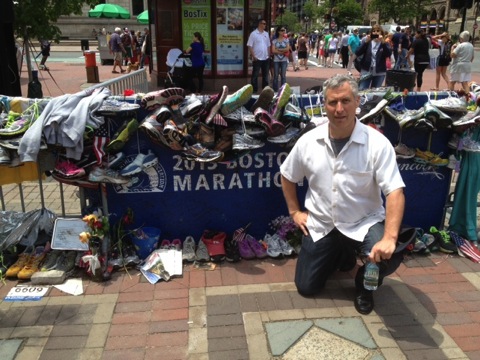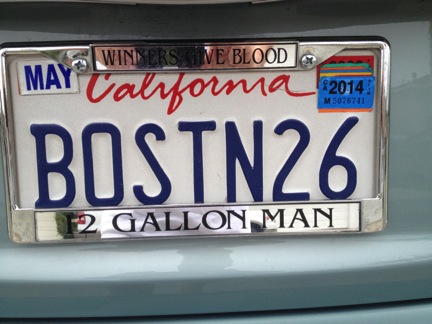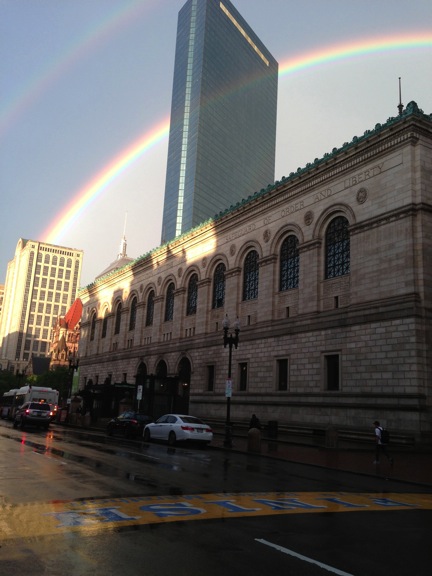
Two months, two days, ten hours and fifteen minutes after the opening gun of the 2013 Boston Marathon, I finally crossed the finish line on Boylston Street and completed my race.

As everyone knows, the Boston Marathon became synonymous with terror and tragedy when two Chechnyan brothers allegedly exploded homemade bombs near the finish line, killing three and maiming hundreds. It was my good fortune to be six miles away, back at mile twenty, just shy of the crest of Heartbreak Hill, when the bombs exploded and the race was ended.
Although I was far from the finish line, I was still deeply affected when the race was cut short. The emotions were myriad, swirling, contradictory, and all-consuming. Grief for those who had been killed. Survivor guilt for having been so far from the scene. Anger that something so precious to me had been ripped from me. Frustration at my inability to finish. And fear that the destruction of the Marathon symbolized the end of the casual freedom we Americans have for so long taken for granted.

From the day of the race on, I found myself wandering in a spiritual daze, unable to shake off the contradictory effects of having been part of a group targeted by Islamist terrorists and at the same time in no more danger than had I stayed home in Southern California. After a week or so of such confusion, it became apparent to me that I would have to return to Boston and finish the race.
Which I did, on Monday, June 17, exactly nine weeks later. There have been many organized completions by runners, but I was unaware of anyone who shared the precise six-mile deficit that was running my life. So I booked a flight to Boston and a hotel room near the finish line, packed my running gear, and went back East.
The Boston Marathon to me is more than a race. I've done it now five times in the last nine years, starting at age 46. The idea that a kid who was picked last pretty much every time on the playground and who basically went 0 for childhood in Little League could enter and complete the most historic and vaunted of all foot races, the Boston Marathon, is perhaps the single most unlikely event in my entire adult life. For me, running the Boston symbolizes the ability to overcome physical and mental obstacles -- not just to long-distance running, but to long-distance anything.
To put it simply, if I can run the Boston Marathon, I can do pretty much anything. And so can anyone else.
The Boston Marathon is so important to me as a symbol of possibility that my license plate reads BOSTN26.

So to have the experience of completing that race ripped from me, while it doesn't compare to the loss of life and limb that occurred in the mayhem at the finish line, was still the equivalent of witnessing someone steal part of my soul.
My flight landed at four o'clock Boston time. I took the T, Boston's ancient (and first in the nation) subway system, to downtown Boston and crossed the Boston Common, where, nine weeks and seven hours earlier, I had mustered along with the other 22,000 runners early that morning for the school buses that would take us to Hopkinton, Massachusetts and the start line. It was eerie to think of the innocence and optimism we all shared that early dawn, utterly unaware of the tragedy that would follow.
I dropped my bags at my hotel, a small club that I had chosen because it was three blocks from the finish line. I jumped back in the T and rode out to Brookline, where I caught a cab for the intersection of Commonwealth and Grant Avenues, where, nine weeks earlier, police had strung yellow crime scene tape across the route of the race, ending my marathon.
The cabbie was African. When I told him I wanted to go to Newton, he told me the fare would be $80.
"Eighty dollars!" I exclaimed in mock outrage. "For a fifteen-minute ride?"
"White people have all the money," he told me. "Newton is white people country. If that's where you want to go, I'm gonna charge you 80 bucks."
We teased each other about racism and reverse racism and then I told him the purpose of my trip. He was astonished.
"You spent thousands of dollars to come all the way from California to run six miles?" he asked, incredulous. "I am charging you $80 for this cab ride!"
I explained that I had bought the ticket on miles and that my hotel room cost $140, that I was completing the race on the cheap, and I was only going to pay whatever the meter said. After I showed him my 2013 Boston Marathon medal -- which the Boston Athletic Association had sent to all those who finished at least half the race, in a perfect gesture of goodwill -- he started to ask me about running. He said he was 37 and wanted to know how to train to do a marathon.
I told him what I knew, and we went back and forth on the subject until we got to the corner of Grant and Comm. Ave., where I had been taken off the course in a squad car nine weeks earlier.
"Let's just note," I said, teasing him, "that a 37-year-old African man has been asking a 54-year-old white man how to run a marathon."
"Not all Africans run marathons," he countered.
I paid him the fare -- $15 plus tip, not $80 -- and jumped out of the cab. Somehow appropriately, a squad car, lights flashing and siren blaring, shot by on Comm. Ave. at that moment, transporting me back to the emotions of fear and danger that I had carried when my race was ended nine weeks earlier.
Without any fanfare, and without any companionship, I began the run back to the Back Bay. There was a honk and a wave -- it was the cabbie, heading back to Brookline to pick up another fare. It was heartening.
And then a moment later, the rains came.
The thunderclouds had been gathering all afternoon, and now the sky opened. The downpour was steady at first and then torrential. I was soaked to the skin in minutes. Others were running, but mostly to get out of the rain. It didn't matter. I didn't care if I caught double pneumonia. I felt giddy as I ran through Newton, the rain cleansing my spirit of the anxiety and grief that I had been carrying since forced to halt my rain.
Heartbreak Hill is the name given to the last of the Newton hills, a stretch of about four and a half miles that's practically straight up, so named because, decades earlier, one runner lost his lead to another at the top of that hill. As soon as you reach it, you are rewarded with a view of the spires of Boston College, an exceptionally welcome sight because it signifies that the worst is over. It's literally all downhill from here -- down the back of Heartbreak Hill to Brookline, and then a fairly flat, barely undulating course past Coolidge Corner, Fenway Park, Kenmore Square, and then the finish line.
I ran madly, joyously, and much faster than I did the day of the race. It's a lot easier to run the last six miles when you've had nine weeks since the previous twenty. I also wanted to get out of the rain.
I ran past the landmarks on the course that mean so much to me personally: the Dunkin' Donuts where my business mentor first sat me down and showed me how to start what has become my ghostwriting company; the place of a first kiss with a prior fiancée; the spot where I met my mentor, nineteen years and four months ago; Coolidge Corner, where I used to live; Fenway, where I had attended dozens of Red Sox games over the years; and then into the Back Bay.
One of the greatest experiences for any runner is a first glimpse of the finish line. In Boston, you get that when you make the left turn onto Boylston Street and suddenly the finish is just a few hundred yards away. This was a view I had been denied nine weeks earlier; this was a view I granted myself, in the heavy rain, now flooded with peace and joy. In 2009, my third Boston, I had suddenly noticed at this same spot, two blocks from the finish line, a hand in my hand. I looked to see what was happening and realized that the hand belonged to Uta Pippig, who had won the Boston Marathon three times in a row and as an active service to the running community, would grab the hand of random runners and escort them to the finish line. It's a little like LeBron coming to your back yard to shoot hoops with you. It doesn't happen anywhere but at the Boston.
At the moment I reached the finish line, Boylston Street was curiously free of traffic, so I crossed the line right in the middle of the street, as if the full paraphernalia of the finish were still present. I raised my arms and thanked God for the strength He had given me to run and for the courage to tell my wife and kids that I had to go to Boston to finish the thing.
I stood in the pouring rain at the finish line, not tired in the least, exhilarated, delighted, and free of the anxiety that had taken root in my heart nine weeks earlier. I explained to a stranger what I was doing and asked him to take a photo of me at the finish line, clutching my 2013 Boston Marathon medal, of which I now felt I had taken true possession. And then I turned around and realized that I was standing at the exact spot of the explosions.
I thought back and tried to imagine the carnage that had taken place here. It was impossible. I had lived and worked in Boston for many years. I had taught private writing classes in a church a block from the finish line and had spent endless hours at work, writing and preparing for those classes, in the Boston Public Library, alongside the finish. This wasn't just the end of a race; this was my home. That evening, I met Jack Fultz, who had won the 1976 addition of the Boston Marathon and is currently the athletic director of the Dana-Farber Marathon Challenge, for which I raise funds in order to earn a bib to run the Boston.
Along with Jack was Dave Fortier, who had also run the 2013 Boston Marathon as well in 2013. Dave was directly behind the older runner who had been driven to his knees by the blast and was the subject of the most famous photographs of the death and destruction at the finish line. Dave took shrapnel in his foot, was completely spun around by the concussive force of the blasts, and managed to finish the race anyway, and is still affected by an endless ringing in his ears from having been just steps away from where the explosions took place. The three of us gathered at a bar to watch game three of the Stanley Cup and talk about Boston Marathons past and present. It was very gracious of Jack to give up an evening, but that's just how things are when you're connected with Dana-Farber.
The most extraordinary aspect of the evening took place on my way to joining the two men. As I walked from my hotel back to Boylston Street to meet them, the storm had passed and a magnificent rainbow crossed the sky, punctured only by the steel and glass of the John Hancock building, with the base of the rainbow precisely over the Boston Marathon finish line.
Everyone was taking photos of the rainbow, but I knew that it was mine. It was my rainbow.

In the Book of Genesis, God places a rainbow in the sky as a signal to Noah that no longer would death and destruction be rained down upon the inhabitants of the Earth. This is the symbolic meaning of the rainbow in the Judeo-Christian tradition. I'd like to believe that the rainbow I saw that night in Boston symbolizes the exact same thing.
A marathon is more than just a race; it is an opportunity for a million random acts of kindness between runner and runner, runner and spectator, runner and volunteer. It's an opportunity for individuals to reach inside themselves and discover a capacity for achievement that they might never have suspected they possessed. It's an opportunity for spectators to be inspired by the dedication of thousands of ordinary individuals who are looking to bring out the best in themselves at the price of exhaustion, a little bit of pain, and the possibility of injury.
My run through the rain, which I call my Unfinished Business 10K, gave me a measure of peace and completion for which I am truly grateful. I'm hoping that the rainbow I saw at the finish line an hour after I crossed, two months, two days, ten hours and fifteen minutes after I started, will usher in an era of peace and understanding for everyone.
I would go on longer, but I'm parked outside my gym. I've got to train right now. My next race is just around the corner.
